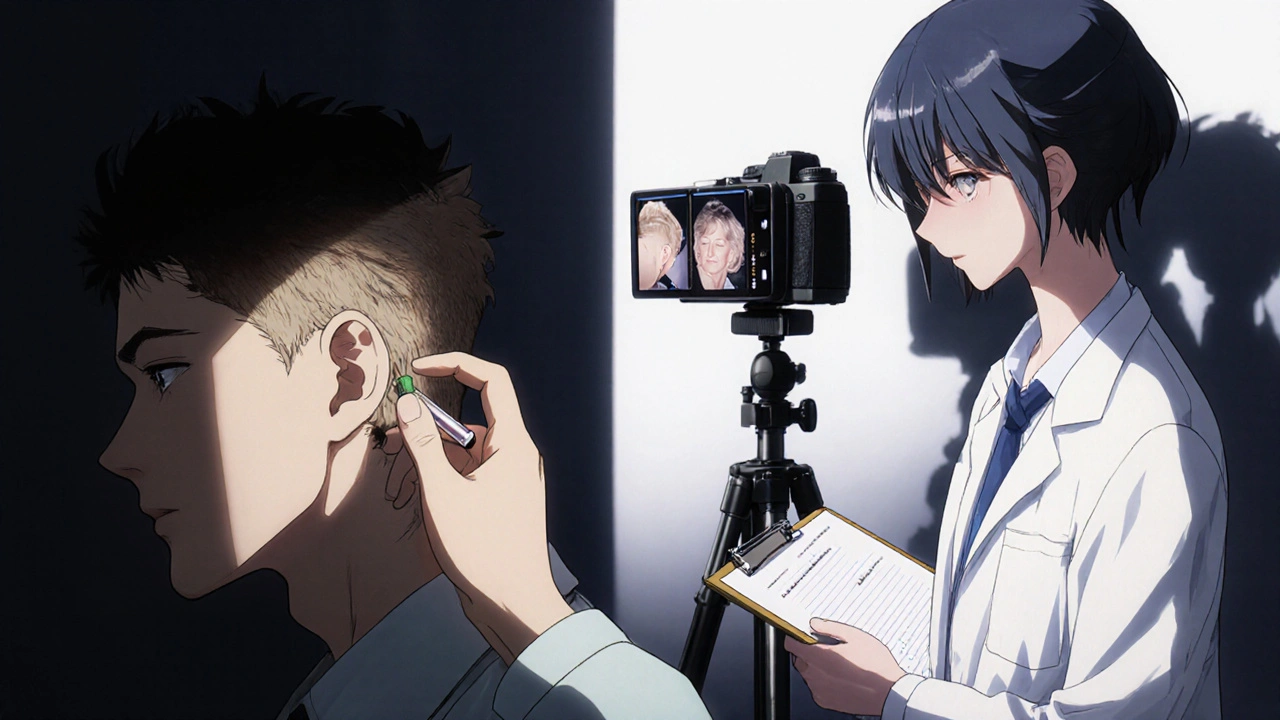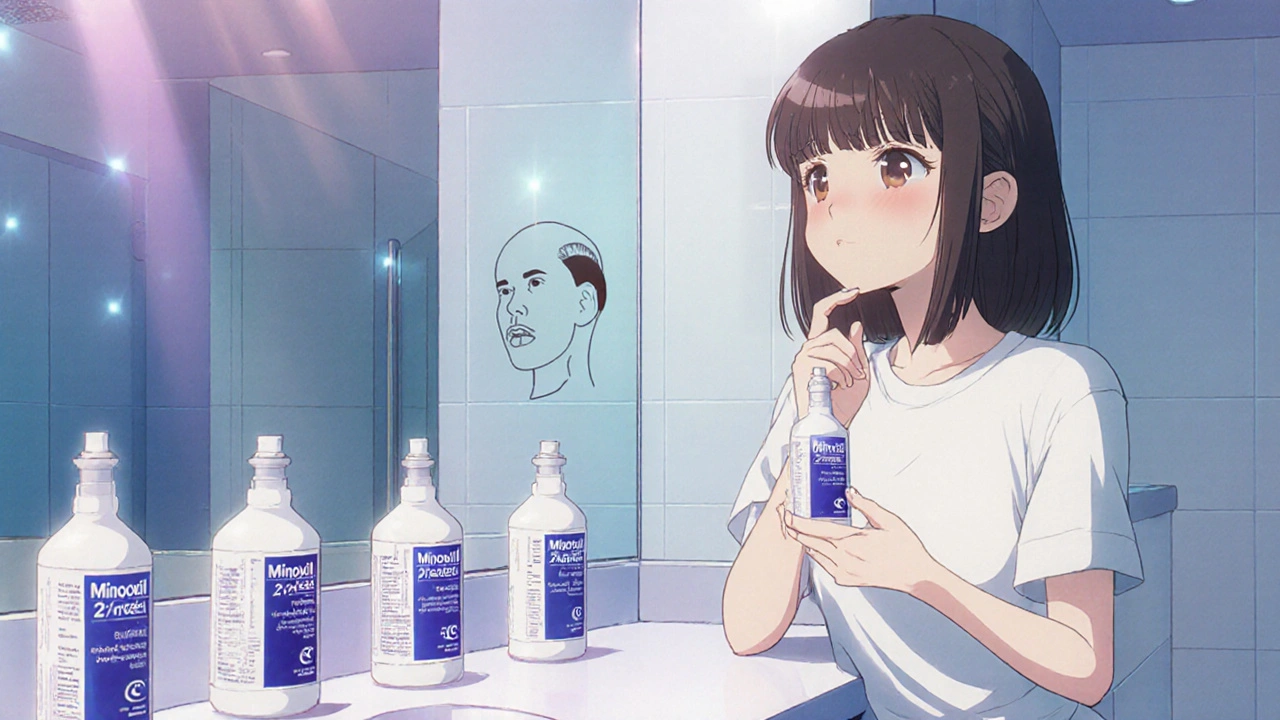Minoxidil Strength Advisor
Choose your profile
Answer these questions to get your personalized minoxidil strength recommendation.
Recommended Minoxidil Strength
Finding the perfect Minoxidil topical solution is a liquid medication applied to the scalp that stimulates hair growth can feel like hunting for a needle in a haystack. Do you go with the low‑dose 2% version, jump straight to the 5% bottle, or even try the newer 10% formulations? This guide walks you through the science, the personal factors, and the practical steps so you can land on the strength that matches your needs without guesswork.
Key Takeaways
- 2% minoxidil is usually enough for women and beginners; 5% is the standard for men and for those who need a quicker response.
- Scalp sensitivity, hair‑loss pattern, and any concurrent medications (like finasteride) dictate the safest concentration.
- Start low, monitor for irritation, then consider stepping up only after 12‑16 weeks of consistent use.
- Patch testing and regular photos are essential to measure real progress.
- Consult a dermatologist if you notice severe itching, rapid shedding, or cardiovascular issues.
What Is Minoxidil and How Does It Work?
Minoxidil started life as an oral blood‑pressure drug in the 1970s. Dermatologists noticed that patients grew extra hair, leading to the first topical formulation in 1988. The active ingredient widens blood vessels around hair follicles, delivering more oxygen and nutrients, which in turn pushes follicles from the resting phase into an active growth phase.
Two core entities drive the hair‑loss cycle: Dihydrotestosterone (DHT) and the hair follicle itself. In Androgenetic alopecia, DHT binds to receptors in the follicle, shrinking it over time. Minoxidil doesn’t block DHT, but it creates a more favorable environment for the follicle to survive despite the hormone’s presence.
Factors That Influence the Ideal Strength
Choosing the right concentration isn’t a one‑size‑fits‑all decision. Below are the biggest variables you should weigh.
- Gender and hormonal profile: Women generally start with 2% because their scalp tends to be more sensitive, and hormonal fluctuations are less aggressive than in men. Men often see faster results with 5%.
- Pattern of hair loss: If you’re in the early stages (Norwood 1‑2 for men, Ludwig I for women), 2% may be sufficient. Advanced thinning (Norwood 3 + or Ludwig II‑III) usually benefits from the stronger dose.
- Scalp sensitivity: A history of eczema, psoriasis, or frequent dermatitis raises the risk of irritation. Starting at 2% reduces that risk.
- Concurrent medications: Some doctors pair minoxidil with Finasteride (a DHT blocker). When you’re already reducing DHT, a higher minoxidil concentration can tip the scales toward better growth without extra hormonal stress.
- Regulatory status: In the United States, the FDA has cleared 2% for over‑the‑counter (OTC) use by women and 5% for men. Anything above 5% remains prescription‑only in most regions.
2% vs 5%: A Direct Comparison
| Attribute | 2% Solution | 5% Solution |
|---|---|---|
| Typical users | Women, beginners, sensitive scalps | Men, advanced loss, experienced users |
| Time to visible results | 4‑6 months | 2‑4 months |
| Incidence of itching/redness | ~10 % | ~20‑25 % |
| Initial shedding spike | Low to moderate | Higher (often first 2‑3 weeks) |
| OTC availability (US) | Yes | Yes (5% for men) / Prescription for women |
| Cost per month (average) | $20‑$30 | $30‑$45 |
Both concentrations share the same active ingredient, but the 5% version simply contains more of it per milliliter. That extra dose accelerates follicle stimulation but also ups the chance of irritation.
How to Test and Adjust Your Dosage
- Patch test: Apply a pea‑sized amount of the chosen solution to a small area behind the ear. Wait 24 hours. If redness, burning, or swelling occurs, drop the concentration or switch to a fragrance‑free formula.
- Document baseline: Take clear, well‑lit photos of your scalp from multiple angles before you start. Mark the date on the photo or keep a simple diary.
- Follow the schedule: Apply twice daily for 5% solutions, once daily for 2% if you experience irritation. Consistency beats occasional high‑dose bursts.
- Monitor for shedding: An initial increase in hair loss (known as “shedding phase”) is normal. If shedding continues beyond 6 weeks, reassess the dose.
- Re‑evaluate after 12‑16 weeks: Compare new photos to your baseline. If growth is modest (<10 % increase) and you tolerate the product well, consider stepping up to the next strength.
Remember, the goal isn’t just to add more minoxidil; it’s to find the sweet spot where the scalp stays calm and follicles get the boost they need.

Safety Tips and Common Pitfalls
- Never mix with other scalp products immediately. Let each product dry for at least 30 minutes to avoid dilution.
- Avoid the eyes. Even a tiny splash can cause temporary vision fuzziness.
- Do not apply to irritated or broken skin. Wait until the area heals before restarting.
- Beware of systemic absorption: While rare, high‑dose minoxidil (10%+) can lower blood pressure. If you have a heart condition, check with a doctor first.
- Store properly: Keep the bottle at room temperature, away from direct sunlight. The active ingredient degrades after 12 months once opened.
When to Seek Professional Help
If you notice any of the following, schedule a visit with a Dermatologist:
- Severe itching, swelling, or burning that lasts more than 48 hours.
- Sudden, extensive hair loss beyond the normal shedding phase.
- Unexplained dizziness, rapid heartbeat, or faintness (signs of systemic absorption).
- No visible improvement after 6 months of consistent use.
These professionals can suggest adjunctive therapies-like low‑dose Finasteride for men, or platelet‑rich plasma (PRP) sessions for stubborn cases.
Quick Checklist Before You Buy
- Identify your gender, hair‑loss stage, and scalp sensitivity.
- Start with the lowest effective concentration (2% for most women, 5% for most men).
- Perform a patch test.
- Set a 12‑week review date with photos.
- Keep the product in a cool, dry place.
Choosing the right minoxidil strength isn’t rocket science, but it does require a bit of self‑assessment and patience. Stick to the plan, listen to your scalp, and give the treatment time to work. In most cases, the right dose will give you a noticeably fuller crown without the hassle of constant irritation.
Can I use 5% minoxidil if I’m a woman?
Yes, but it must be prescribed. Women who tolerate the 2% solution well and need faster results may be advised to try a 5% formulation under a doctor’s supervision.

How long does it take to see results?
Most users notice reduced shedding within 4‑6 weeks and visible new growth after 3‑4 months for the 5% strength; 2% often requires 5‑6 months.
Is it safe to combine minoxidil with finasteride?
Combining them is common and generally safe. Minoxidil works locally on the scalp, while finasteride reduces DHT systemically. Always discuss dosage with a dermatologist.
What should I do if I experience severe itching?
Stop using the product immediately, rinse the scalp with cool water, and consult a dermatologist. They may recommend a lower concentration or a foam formulation that contains fewer irritants.
Can I apply minoxidil on a shaved head?
Yes, the solution can be applied directly to a shaved scalp. In fact, many users find absorption easier without hair interfering.



13 Comments
Demetri Huyler
October 20, 2025 AT 19:20Look, if you’re buying American‑made minoxidil you’re already a step ahead. Our labs crank out the purest 5% solution, so ditch the cheap imports and stick with the real deal.
JessicaAnn Sutton
October 21, 2025 AT 23:06While the efficacy of a 5% formulation is well‑documented, it is incumbent upon the consumer to consider dermatological guidance before escalating concentrations. The ethical imperative to avoid self‑medication without professional oversight cannot be overstated. Moreover, the market is saturated with counterfeit products that fail to meet regulatory standards.
Israel Emory
October 23, 2025 AT 02:53Friends, let’s be clear: the choice of minoxidil concentration hinges on three primary variables – scalp sensitivity, stage of alopecia, and personal tolerance. If you’ve experienced eczema, start low; if you’re in Norwood 3, you may benefit from the stronger dose. Consistency trumps occasional high‑dose spikes, and documentation via photos is essential. Patience, however, remains the ultimate virtue.
Wesley Humble
October 24, 2025 AT 06:40Empirical data indicate that the 5% solution accelerates the anagen phase by approximately 20 % relative to the 2% variant, albeit at the cost of heightened dermatologic adverse events. Clinicians therefore recommend a graduated titration protocol to mitigate irritation. 📈🧪
barnabas jacob
October 25, 2025 AT 10:26Yo, the pharmaco‑kinetics of minox are legit, but u gotta watch the dermal permeability coefficent, especially if you’re rockin’ an oily scalp. If ur follicle density is low, the 10% conc might sound dope, but trust me, the risk‑benefit ratio is whack.
jessie cole
October 26, 2025 AT 13:13Fear not, brave scalp warrior! The path from thinning to thriving may seem daunting, yet each disciplined application builds the foundation for renewed vigor. Embrace the routine, celebrate tiny gains, and remember: perseverance writes the ultimate success story.
Kirsten Youtsey
October 27, 2025 AT 17:00One must suspect that the pharmaceutical giants are deliberately keeping the 10% minoxidil under wraps, fearing a loss of market control. Their obfuscation tactics, veiled as “regulatory restrictions,” serve only to perpetuate dependence on overpriced, lower‑dose products. It’s a classic case of profit over patient welfare.
laura wood
October 28, 2025 AT 20:46I understand how overwhelming all these options can feel. Take a moment to breathe, note your scalp’s reactions, and trust the gradual process. You’re not alone in navigating this journey.
Matthew Hall
October 30, 2025 AT 00:33Dude, the whole minoxidil hype is a circus, and the real truth is hidden behind layers of corporate propaganda. Everyone’s told to buy the 5% hype, but the elite know the 10% is the true game‑changer – they just don’t want us to find out.
Vijaypal Yadav
October 31, 2025 AT 04:20From a pharmacological standpoint, minoxidil functions as a potassium channel opener, which induces vasodilation and subsequently augments follicular blood flow. The resultant hyperoxygenation facilitates the transition from telogen to anagen phase, thereby promoting hair shaft elongation. This mechanism is independent of androgenic activity.
Ron Lanham
November 1, 2025 AT 08:06Choosing the appropriate minoxidil concentration is not merely a matter of personal preference but a complex decision that intertwines physiological variables, lifestyle considerations, and medical guidance. First, the baseline severity of alopecia dictates the initial therapeutic threshold; individuals with early-stage thinning may achieve satisfactory results with 2% while those with advanced Norwood classifications often require the heightened potency of 5% to stimulate dormant follicles. Second, scalp dermatologic health plays a pivotal role, as pre‑existing conditions such as seborrheic dermatitis can amplify the irritant potential of higher concentrations, necessitating a cautious, incremental approach. Third, the frequency of application interacts with systemic absorption rates, where twice‑daily dosing of a 5% solution can marginally increase plasma levels, albeit still within safe limits for most adults. Fourth, patient adherence is profoundly influenced by the perceived speed of visible improvement; a faster response may reinforce compliance, yet premature escalation can precipitate the dreaded shedding phase. Fifth, the economics of long‑term therapy cannot be ignored, for the cumulative cost differential between 2% and 5% products may affect continuity of treatment. Sixth, regulatory landscapes differ internationally, with some jurisdictions mandating prescription status for concentrations above 5%, thereby imposing additional barriers to access. Seventh, concomitant use of adjunctive agents such as finasteride may synergize with minoxidil, allowing for lower concentrations while still achieving robust outcomes. Eighth, the psychosocial impact of hair loss underscores the necessity for a tailored regimen that aligns with the patient’s confidence and quality‑of‑life goals. Ninth, documented side‑effects, ranging from mild pruritus to transient hypertrichosis, should be systematically monitored through photographic logs and symptom diaries. Tenth, dermatologists often recommend a patch test prior to full‑scale deployment to identify hypersensitivity reactions early. Eleventh, the formulation’s vehicle-foam versus liquid-can influence scalp tolerance, with foam generally perceived as less greasy. Twelfth, emerging data suggest that intermittent cycling of minoxidil may mitigate tachyphylaxis, though robust evidence remains pending. Thirteenth, patient education regarding the inevitable shedding phase helps set realistic expectations and prevents premature discontinuation. Fourteenth, insurance coverage variability may dictate whether a prescription‑strength product is financially viable. Fifteenth, the ultimate metric of success remains the increase in hair shaft density quantified by trichoscopic analysis. Finally, continuous dialogue with a qualified dermatologist ensures that any adverse trends are swiftly addressed, optimizing both safety and efficacy.
Natalie Morgan
November 2, 2025 AT 11:53Thanks for the thorough breakdown, it really puts the decision into perspective.
Mahesh Upadhyay
November 3, 2025 AT 15:40Bottom line: start low, stay consistent.